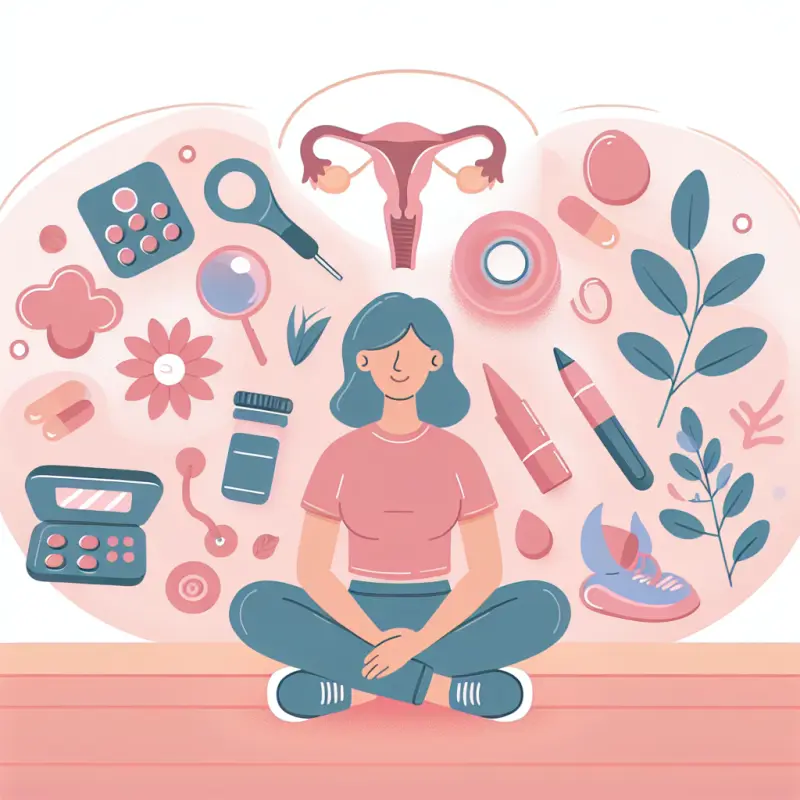Adrenal Fatigue and Its Impact on Menstrual Cycles

Adrenal Fatigue and Its Impact on Menstrual Cycles
Introduction
In today's fast-paced world, the term 'adrenal fatigue' has become increasingly common. As stress becomes more pervasive, more people are experiencing symptoms associated with adrenal fatigue, a condition believed to result from prolonged exposure to stress. While the medical community continues to debate its validity, many alternative health practitioners and individuals report significant health impacts, particularly for women. One area of concern is the relationship between adrenal fatigue and menstrual cycles. This article delves into how adrenal fatigue can affect menstrual health, exploring the underlying mechanisms, symptoms, and potential management strategies.
Understanding Adrenal Fatigue
What is Adrenal Fatigue?
Adrenal fatigue is not a formally recognized medical diagnosis, but it is used to describe a collection of symptoms believed to result from overworked adrenal glands. The adrenal glands, located on top of the kidneys, are responsible for producing hormones such as cortisol, adrenaline, and aldosterone, which help regulate stress responses, metabolism, blood pressure, and more.
Key Functions of Adrenal Glands:
- Cortisol Production: Helps manage stress, reduce inflammation, and regulate metabolism.
- Adrenaline Production: Increases heart rate and energy levels during stress.
- Aldosterone Regulation: Maintains electrolyte balance and blood pressure.
Causes of Adrenal Fatigue
Adrenal fatigue is thought to result from chronic stress, whether emotional, physical, or environmental. Factors contributing to adrenal fatigue include:
- Chronic Stress: Persistent work pressure, financial worries, or relationship issues.
- Poor Diet: High intake of processed foods and sugars.
- Lack of Sleep: Inadequate rest and recovery.
- Infections and Illnesses: Frequent colds or chronic diseases.
- Stimulant Overuse: Excessive caffeine or nicotine consumption.
The Menstrual Cycle: An Overview
To understand how adrenal fatigue impacts the menstrual cycle, it's essential to grasp how the cycle functions.
Phases of the Menstrual Cycle
- Menstrual Phase (Days 1-5): Shedding of the uterine lining.
- Follicular Phase (Days 1-13): Follicle-stimulating hormone (FSH) promotes egg maturation.
- Ovulation (Day 14): Release of the mature egg from the ovary.
- Luteal Phase (Days 15-28): Corpus luteum forms, producing progesterone to prepare the uterus for pregnancy.
Hormonal Regulation
The menstrual cycle is regulated by a delicate balance of hormones, including:
- Estrogen: Peaks during the follicular phase, thickening the uterine lining.
- Progesterone: Dominant in the luteal phase, preparing the uterus for potential implantation.
- Luteinizing Hormone (LH): Triggers ovulation.
- Follicle-Stimulating Hormone (FSH): Stimulates follicle development.
Adrenal Fatigue and Its Impact on Menstrual Cycles
Hormonal Imbalance
When adrenal glands are overtaxed, they may not produce adequate cortisol, leading to a cascade of hormonal imbalances:
- Decreased Progesterone Production: Cortisol production takes precedence over progesterone synthesis, leading to a relative estrogen dominance.
- Altered Estrogen Levels: Imbalanced estrogen can lead to irregular periods, heavy bleeding, or missed cycles.
- Impact on Thyroid Function: Adrenal fatigue can also affect thyroid hormones, further disrupting menstrual regularity.
Symptoms of Menstrual Irregularities Due to Adrenal Fatigue
Women experiencing adrenal fatigue may notice changes in their menstrual cycles, including:
- Irregular Periods: Cycles that are shorter or longer than usual.
- Amenorrhea: Absence of menstruation for extended periods.
- Menorrhagia: Heavy or prolonged menstrual bleeding.
- Dysmenorrhea: Painful periods with severe cramps.
The Role of Cortisol
Cortisol, the primary stress hormone, plays a crucial role in the body’s stress response. When stress is chronic, the constant demand for cortisol can lead to:
- Cortisol Steal: The body prioritizes cortisol production over sex hormones like progesterone.
- Insulin Resistance: High cortisol levels can lead to insulin resistance, affecting ovulation and fertility.
- Suppressed Ovulation: Chronic stress may suppress the hypothalamic-pituitary-ovarian (HPO) axis, disrupting ovulation.
Managing Adrenal Fatigue and Its Effects on Menstrual Health
Lifestyle Modifications
Adopting a holistic approach is essential for managing adrenal fatigue and its impact on menstrual cycles.
- Stress Management: Incorporate stress-reducing activities such as yoga, meditation, or deep breathing exercises.
- Balanced Diet: Focus on whole foods, lean proteins, healthy fats, and complex carbohydrates.
- Adequate Sleep: Aim for 7-9 hours of quality sleep each night.
- Regular Exercise: Engage in moderate physical activities like walking, swimming, or cycling.
- Limit Stimulants: Reduce caffeine and nicotine intake to lower stress on adrenal glands.
Nutritional Support
Certain nutrients and supplements can support adrenal health and hormonal balance:
- Vitamin C: Supports adrenal gland function and reduces cortisol levels.
- B Vitamins: Essential for energy production and stress reduction.
- Magnesium: Helps regulate the stress response and improve sleep quality.
- Adaptogenic Herbs: Ashwagandha, rhodiola, and holy basil may help reduce stress and support adrenal function.
Medical Interventions
In some cases, medical interventions may be necessary to address severe hormonal imbalances:
- Hormone Therapy: Progesterone or estrogen therapy may be prescribed to regulate menstrual cycles.
- Thyroid Support: Thyroid hormone replacement may be needed if thyroid dysfunction is present.
- Consultation with Healthcare Providers: Work with an endocrinologist or gynecologist to tailor a treatment plan.
Conclusion
Adrenal fatigue, while not universally recognized as a medical condition, can have profound effects on women's health, particularly concerning menstrual cycles. The interplay between stress, adrenal function, and hormonal balance underscores the importance of a comprehensive approach to health. By understanding the potential impacts and adopting lifestyle changes, women can work towards restoring balance and improving their menstrual health. As research continues to evolve, ongoing dialogue between patients and healthcare providers remains crucial in addressing these complex interconnections.